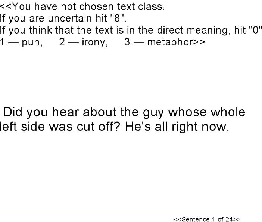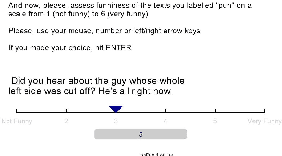Get our free extension to see links to code for papers anywhere online!Free add-on: code for papers everywhere!Free add-on: See code for papers anywhere!
Julia Murzina
Psycho-linguistic Experiment on Universal Semantic Components of Verbal Humor: System Description and Annotation
Jul 10, 2024Figures and Tables:



Abstract:Objective criteria for universal semantic components that distinguish a humorous utterance from a non-humorous one are presently under debate. In this article, we give an in-depth observation of our system of self-paced reading for annotation of humor, that collects readers' annotations while they open a text word by word. The system registers keys that readers press to open the next word, choose a class (humorous versus non-humorous texts), change their choice. We also touch upon our psycho-linguistic experiment conducted with the system and the data collected during it.
* 5 pages, 4 figures, preprint submitted to journal in 2023
Via
 Add to Chrome
Add to Chrome Add to Firefox
Add to Firefox Add to Edge
Add to Edge